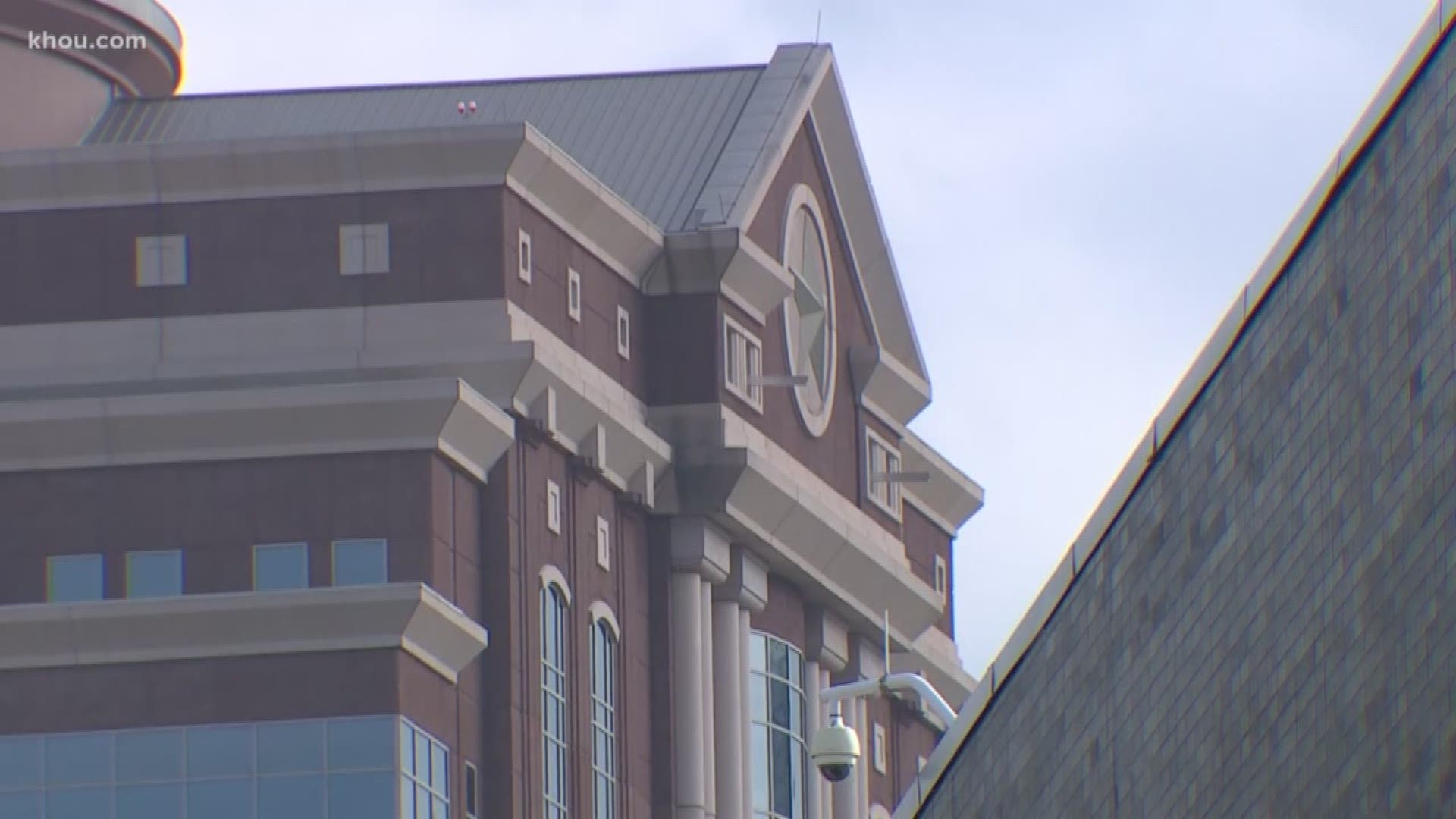HARRIS COUNTY, Texas — The release of Harris County Jail inmates was stopped in its tracks Friday a few hours after it started.
The first group of 12 nonviolent offenders who met requirements specified in an emergency order were released to help stop the spread of COVID-19.
Not long after they left, a court order was issued ordering Harris County Sheriff Ed Gonzalez to stop releasing felony inmates.
Earlier this week, the sheriff was ordered to release about 1,000 inmates by County Judge Lina Hidalgo, who called the jail a "ticking time bomb" for coronavirus.
“It basically tells me the script is going to keep changing," said Andy Kahan, Director of Victims' Services at Crime Stoppers.
He was surprised to learn Harris County District Criminal Court Administrative Judge Herb Ritchie stepped in. The release so far are all had non-violent charges ranging from drug possession to fraud.
However, several cases caught Kahan’s eye: A 53-year-old man charged with theft, a case where prosecutors actually asked for a high bond because the man had nine previous felony convictions.
Then, there’s a 34-year-old man charged with unauthorized use of a vehicle and evading arrest. Prosecutors objected to a personal bond because he had a prior aggravated assault charge that was pled down to deadly conduct and he poses a significant risk to the community.
“The ones we saw that were actually released are career, non-violent, habitual offenders with rap sheets,” Kahan said.
However, a defense attorney representing a 25-year-old man who was released disagrees.
“He doesn’t have a violent history. This his first felony," said Equator L. Turner.
Her client was charged with tampering with a government record. Harris County Judge Lina Hidalgo wants inmates like him released because she says she’s trying to prevent an outbreak in the jail that could clog our hospital system.
“We don’t want someone who is going to break into homes, we want to make sure we stay safe during this time, he’s OK, he’s OK to be released into the community,” she said.
Three Harris County Jail inmates and one jailer have tested positive for COVID-19. Thirty more are awaiting test results, and 800 are in quarantine as a precaution.
Friday's court order from the Criminal District Courts says Hidalgo and Gonzalez don't have jurisdiction over releasing felony inmates.
"This is obviously a legal matter and I have two conflicting legal documents. I’m a cop, not a lawyer. I’ll let the lawyers figure it out," Sheriff Gonzalez tweeted. "I respect the separation of powers. I’ve said before, I have no say in who is in our out of jail, my role is to manage the system."
RELATED: Harris County to release about 1,000 'non-violent' inmates, calling jail a 'ticking time bomb'
Those being released are not being absolved of their alleged, nonviolent crimes. If found guilty, those who committed nonviolent crimes will still face justice. They will be provided a new trial date to be determined.
At the moment, county officials believe about 1,000 people fit the criteria for release.
KHOU 11 is not naming those released, because they have not been convicted. This fight between Harris County and the district judges could likely be something a higher court will have to decide.
Coronavirus symptoms
The symptoms of coronavirus can be similar to the flu or a bad cold. Symptoms include a fever, cough and shortness of breath, according to the Centers for Disease Control. Some patients also have nausea, body aches, headaches and stomach issues. Losing your sense of taste and/or smell can also be an early warning sign.
Most healthy people will have mild symptoms. A study of more than 72,000 patients by the Centers for Disease Control in China showed 80 percent of the cases there were mild.
But infections can cause pneumonia, severe acute respiratory syndrome, kidney failure and even death, according to the World Health Organization. Older people with underlying health conditions are most at risk for becoming seriously ill. However, U.S. experts are seeing a significant number of younger people being hospitalized, including some in ICU.
The CDC believes symptoms may appear anywhere from two to 14 days after being exposed.
Human coronaviruses are usually spread through...
- The air by coughing or sneezing
- Close personal contact, such as touching or shaking hands
- Touching an object or surface with the virus on it, then touching your mouth, nose or eyes before washing your hands.
Help stop the spread of coronavirus
- Stay home when you are sick.
- Eat and sleep separately from your family members
- Use different utensils and dishes
- Cover your cough or sneeze with your arm, not your hand.
- If you use a tissue, throw it in the trash.
- Follow social distancing
Lower your risk
- Wash your hands often with soap and water for at least 20 seconds. If soap and water are not available, use an alcohol-based hand sanitizer.
- Avoid touching your eyes, nose, and mouth with unwashed hands.
- Avoid close contact with people who are sick.
- Clean and disinfect frequently touched objects and surfaces.
- If you are 60 or over and have an underlying health condition such as cardiovascular disease, diabetes or respiratory illnesses like asthma or COPD, the World Health Organization advises you to try to avoid crowds or places where you might interact with people who are sick.
Get complete coverage of the coronavirus by texting 'FACTS' to 713-526-1111.
MORE CORONAVIRUS STORIES AT KHOU.COM
- $5 million relief fund launched for residents of Camden properties in Houston, other cities
- Google using location data to show which states are taking social distancing seriously
- 2 Kennedy family members missing after canoe trip near Annapolis
- 'Blessed ending' | Houston man whose 'lungs were ravaged' by coronavirus released from hospital
- Texas alcohol distilleries making hand sanitizer for first responders and healthcare workers
- Coronavirus crimes: Houston police tracking cases of stolen COVID-19 supplies

